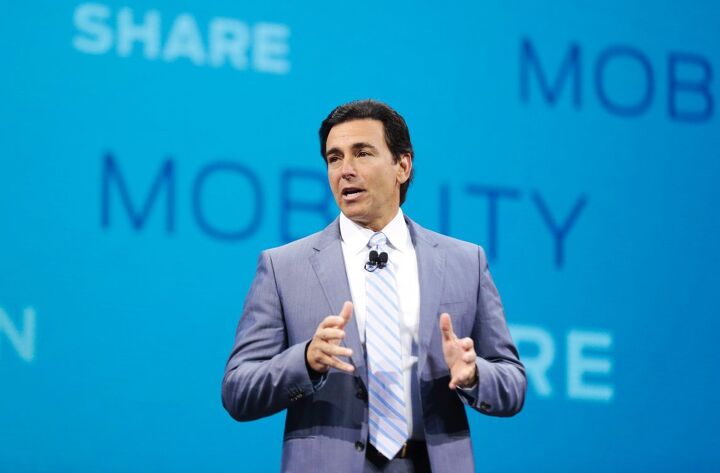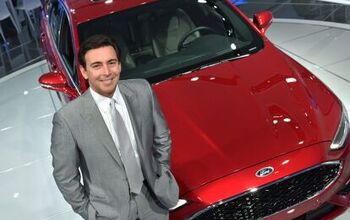Ford to Announce Firing of CEO Mark Fields This Morning: Report

Mark Fields has reportedly been fired from his position as CEO of Ford Motor Company, to be replaced by a man he appointed as head of the automaker’s mobility subsidiary.
According to Forbes, the company will announce the appointment of Jim Hackett as CEO this morning, part of a broader shakeup of the company’s upper ranks. Hackett, former CEO of Steelcase, served on the automaker’s board for three years before being named head of Ford Smart Mobility LLC in March, 2016.
Fields, a 28-year Ford veteran who replaced Alan Mulally in mid-2014, was reportedly booted by the company’s board amid a continued decline in share values. Two weeks ago, the CEO was grilled by board members and shareholders alike over the direction he has taken the company.
Sources told Forbes Executive Chairman Bill Ford and the rest of the board had lost confidence in Fields’ ability to run the company. Since taking the helm, Ford’s share prices have dropped by 40 percent. Compared to rival GM’s aggressive streamlining and healthier balance sheet, Ford recently saw its first-quarter profits sink 35 percent.
Many question whether Field’s aggressive push for Ford’s entry into the realm of mobility services has harmed the company’s financial footing.
The report suggests new roles are on the way for other executives within the company. Those individuals include James Farley, president of Ford’s Europe, Middle East and Africa division, and Joseph Hinrichs, head of Ford North America. Ray Day, group vice president of communications, will reportedly be replaced by Mark Trudy, vice president of communications for the company’s Asia-Pacific division.
Before being named CEO on July 1, 2014, Fields served as Ford’s chief operating officer. Ford has announced a news conference at its world headquarters in Dearborn at 9:45 this morning.
[Image: Ford Motor Company]

More by Steph Willems
Latest Car Reviews
Read moreLatest Product Reviews
Read moreRecent Comments
- Peter Buying an EV from Toyota is like buying a Bible from Donald Trump. Don’t be surprised if some very important parts are left out.
- Sheila I have a 2016 Kia Sorento that just threw a rod out of the engine case. Filed a claim for new engine and was denied…..due to a loop hole that was included in the Class Action Engine Settlement so Hyundai and Kia would be able to deny a large percentage of cars with prematurely failed engines. It’s called the KSDS Improvement Campaign. Ever hear of such a thing? It’s not even a Recall, although they know these engines are very dangerous. As unknowing consumers load themselves and kids in them everyday. Are their any new Class Action Lawsuits that anyone knows of?
- Alan Well, it will take 30 years to fix Nissan up after the Renault Alliance reduced Nissan to a paltry mess.I think Nissan will eventually improve.
- Alan This will be overpriced for what it offers.I think the "Western" auto manufacturers rip off the consumer with the Thai and Chinese made vehicles.A Chinese made Model 3 in Australia is over $70k AUD(for 1995 $45k USD) which is far more expensive than a similar Chinesium EV of equal or better quality and loaded with goodies.Chinese pickups are $20k to $30k cheaper than Thai built pickups from Ford and the Japanese brands. Who's ripping who off?
- Alan Years ago Jack Baruth held a "competition" for a piece from the B&B on the oddest pickup story (or something like that). I think 5 people were awarded the prizes.I never received mine, something about being in Australia. If TTAC is global how do you offer prizes to those overseas or are we omitted on the sly from competing?In the end I lost significant respect for Baruth.


































Comments
Join the conversation
Lots of Monday morning quarterbacking here. Ford is doing fine, but could be better. The F150 was a huge risk that worked out very well. Lincoln is dong well for the minimal investment involved - particularly versus the huge sums misspent at Cadillac. Ford's biggest problems are reliability and fuel efficiency. The vehicles have sub par reliability, and the efficiency on their turbo cars - especially the real world results - are terrible. Hard to justify great new investments in small cars, but if the focus and fiesta were reliable and fuel efficient they would,be respectable contenders in their classes. Ford also has moved to break even in Europe, while GM had to give up and abandon that market.
Well said, Deadweight! I commend you. Succinct too! I would add this: That is generally the way it has been for a while. During the eras from 1900 to 1930, and again 1945-1973, the interests of big money coincided with the interests of "middle" and "working" America. That is, the path to even bigger riches for big money was to invest and to PAY the masses well. Since 1973 in America, and 1990 in the West in general, this has ceased to be the case. This is why we (the 'average' American) is running--on a treadmill, and going backwards.